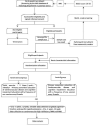Evaluation of eight-style Tai chi on cognitive function in patients with cognitive impairment of cerebral small vessel disease: study protocol for a randomised controlled trial
- PMID: 33558352
- PMCID: PMC7871699
- DOI: 10.1136/bmjopen-2020-042177
Evaluation of eight-style Tai chi on cognitive function in patients with cognitive impairment of cerebral small vessel disease: study protocol for a randomised controlled trial
Abstract
Introduction: Cerebral small vessel disease (CSVD) is a critical factor that causes cognitive decline and progresses to vascular dementia and acute cerebrovascular events. Tai chi has been proven to improve nerve plasticity formation and directly improve cognitive function compared with other sports therapy, which has shown its unique advantages. However, more medical evidence needs to be collected in order to verify that Tai chi exercises can improve cognitive impairment due to CSVD. The main purposes of this study are to investigate the effect of Tai chi exercise on neuropsychological outcomes of patients with cognitive impairment related to CSVD and to explore its mechanism of action with neuroimaging, including functional MRI (fMRI) and event-related potential (P300).
Methods and analysis: The design of this study is a randomised controlled trial with two parallel groups in a 1:1 allocation ratio with allocation concealment and assessor blinding. A total of 106 participants will be enrolled and randomised to the 24-week Tai chi exercise intervention group and 24-week health education control group. Global cognitive function and the specific domains of cognition (memory, processing speed, executive function, attention and verbal learning and memory) will be assessed at baseline and 12 and 24 weeks after randomisation. At the same time, fMRI and P300 will be measured the structure and function of brain regions related to cognitive function at baseline and 24 weeks after randomisation. Recruitment is currently ongoing (recruitment began on 9 November 2020). The approximate completion date for recruitment is in April 2021, and we anticipate to complete the study by December 2021.
Ethics and dissemination: Ethics approval was given by the Medical Ethics Committee of the Affiliated People's Hospital of Fujian University of Traditional Chinese Medicine (approval number: 2019-058-04). The findings will be disseminated through peer-reviewed publications and at scientific conferences.
Trial registration number: ChiCTR2000033176; Pre-results.
Keywords: complementary medicine; neurology; protocols & guidelines; sports medicine.
© Author(s) (or their employer(s)) 2021. Re-use permitted under CC BY-NC. No commercial re-use. See rights and permissions. Published by BMJ.
Conflict of interest statement
Competing interests: None declared.
References
-
- Peng D, Geriatric Neurology Group, Chinese Society of Geriatrics, Clinical Practice Guideline for Cognitive Impairment of Cerebral Small Vessel Disease Writing Group . Clinical practice guideline for cognitive impairment of cerebral small vessel disease. Aging Med 2019;2:64–73. 10.1002/agm2.12073 - DOI - PMC - PubMed
-
- Corriveau RA, Bosetti F, Emr M, et al. The science of vascular contributions to cognitive impairment and dementia (VCID): a framework for advancing research priorities in the cerebrovascular biology of cognitive decline. Cell Mol Neurobiol 2016;36:281–8. 10.1007/s10571-016-0334-7 - DOI - PMC - PubMed
Publication types
MeSH terms
LinkOut - more resources
Full Text Sources
Other Literature Sources
Miscellaneous

